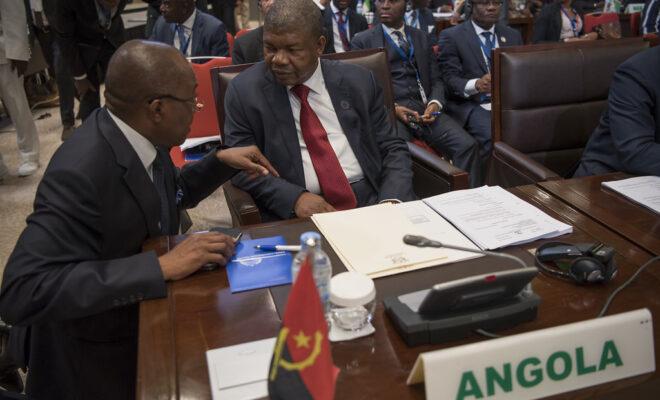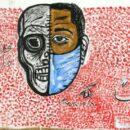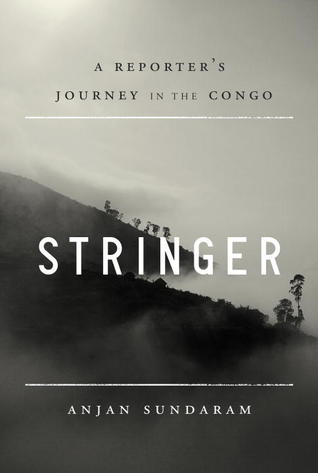How power in Angola is wielded by one man

Roque’s new book shows how the regime came to be ruled by, and came to rule through, fear and paranoia – still does so to this day.

President João Lourenço of Angola at the AU summit in 2018. Credit: Paul Kagame.
One of the most challenging experiences I have as an Angolan is to explain the country’s reality, quirks, and nuances to those unfamiliar with this peculiar country. Every nation has its complexities and I’m obviously biased, but the rich history and exasperating contradictions of this southern African state often leave me frustrated at my inability to articulate a thought or argument on the tip of my tongue.
Paula Cristina Roque has no such problem. In Governing in the Shadows: Angola’s Securitised State, the political analyst authoritatively and succinctly makes an argument I have long struggled to express: that, ultimately, true power in Angola lies in the presidency and nowhere else. Roque painstakingly proves this point in her expansive but tightly wound work, which leads the reader through Angola’s history via the crossroads that led to it becoming a “securitised state”. Written during the pandemic, which had a profound effect on Angola’s economy, and published ahead of upcoming general elections on 24 August, the book could not have come at a better time.
Through Governing in the Shadows, Roque argues that the presidency’s efforts to maintain power at all costs are central to the running of the Angolan state – more so than actual governance of the country or even the interests of the ruling MPLA. The bedrock of the presidency’s authority is Angola’s security network, which is overseen by what Roque refers to as the Security Cabinet of the Presidency (SCP) and is beholden to the head of state alone. It’s no surprise then that Angola spends billions more on security than on health, education, or development, and that the head of the SCP is in many ways the second most powerful man in the country.
When I was growing up in Angola, conversations about the government were only ever had in hushed tones and in the safety of home. When I left the country and began writing publicly about Angolan politics, I received calls from worried relatives warning me to stop. These attitudes are completely reasonable. Since independence in 1975, Angola has experienced a series of horrific traumas that have shaken the nation’s identity to its core and reverberated down the generations.
One of the most harrowing aspects of Roque’s book are her matter of fact but chilling accounts of the brutal civil war that began in 1975 and continued until 2002. She also covers the MPLA’s ruthless purge of a dissenting party faction in 1977, which silenced discussion of politics for decades, and the more recent 2015 Mount Sumi massacre in which the military killed hundreds of members of a religious sect in the Huambo highlands.
For people like me, who did not directly witness the horrors of civil war, who did not see uncollected bodies on the Luanda streets I walk through today, who only heard of the Kuito battles through friends, and who only knew of the Huambo siege through family accounts, Roque’s descriptions provide a timely and disturbing reminder of where we’ve come from. Moreover, in recounting these stories, she shows how the war fuelled the presidency’s (perceived) need to continuously securitise the state. The Angolan regime was ruled by fear and paranoia and, in turn, it ruled through fear and paranoia – and it still does so to this day. It repeatedly emboldens the security forces, who see threats where there are none.
One thing I often notice in coverage of Angola both locally and internationally is the attribution of power to entities that have none. I see articles written about parliament as if it had a voice or about ministers as if they have the authority to take meaningful decisions. They don’t. Power in Angola is wielded by one man – João Lourenço since 2017, and José Eduardo dos Santos for the 38 years previously – and his security apparatus. Ministers, congresspeople, the head of police and armed forces all report to the head of the SCP, who reports to the president. Decisions are made at the top and handed down. Most government officials have little power, not to mention ordinary citizens who don’t even vote for their president. The new 2010 constitution replaced direct presidential elections with a system in which voters cast a single vote for a political party, and the first name on their electoral list becomes president.
As we head into perhaps our most important elections since 1992, I keep thinking of Roque’s chapter in which she comprehensively details just how fraudulent our electoral process is. Opposition parties like UNITA have decried this and even sued the state – to no effect of course – yet, uncannily, discussion of electoral fraud in Angola remains taboo. As a society, we still want to treat our elections as a force for change. We still want to believe that we, as citizens, are empowered. As Roque maintains, however, the reality is that the MPLA is simply not prepared to give up political power.
One of Roque’s most interesting assertions in Governing in the Shadows – an essential book for anyone who wants to understand Angolan politics, along with Ricardo Soares de Oliveira’s Magnificent and Beggar Land – is that Angola was doomed to be a securitised state whether it governed by MPLA or UNITA, the two warring parties in the civil war. The war, its logics and legacies made sure of it. And, as much as my generation did not directly partake in it, we are still condemned to suffer its long-lasting political, economic, and societal effects. The question now is whether we have the capacity to rise above this legacy and participate in our own nation-building, and if the people that currently wield power – either in government or opposition – have the same desire for real change. Angola is a securitised state, but one in which the vast majority of its population have no direct memory of what made it so.
As Roque proclaims: “Bringing the government out of the shadows to share power and privilege with society remains the only way to deliver much-needed security to all Angolans.”
It is up to our generation to do so.
This article is part of a series of book reviews in collaboration with Debating Ideas.
Paula Cristina Roque will be discussing her book at 5-6pm BST on 5 July 2022 in London and online. Register here.





